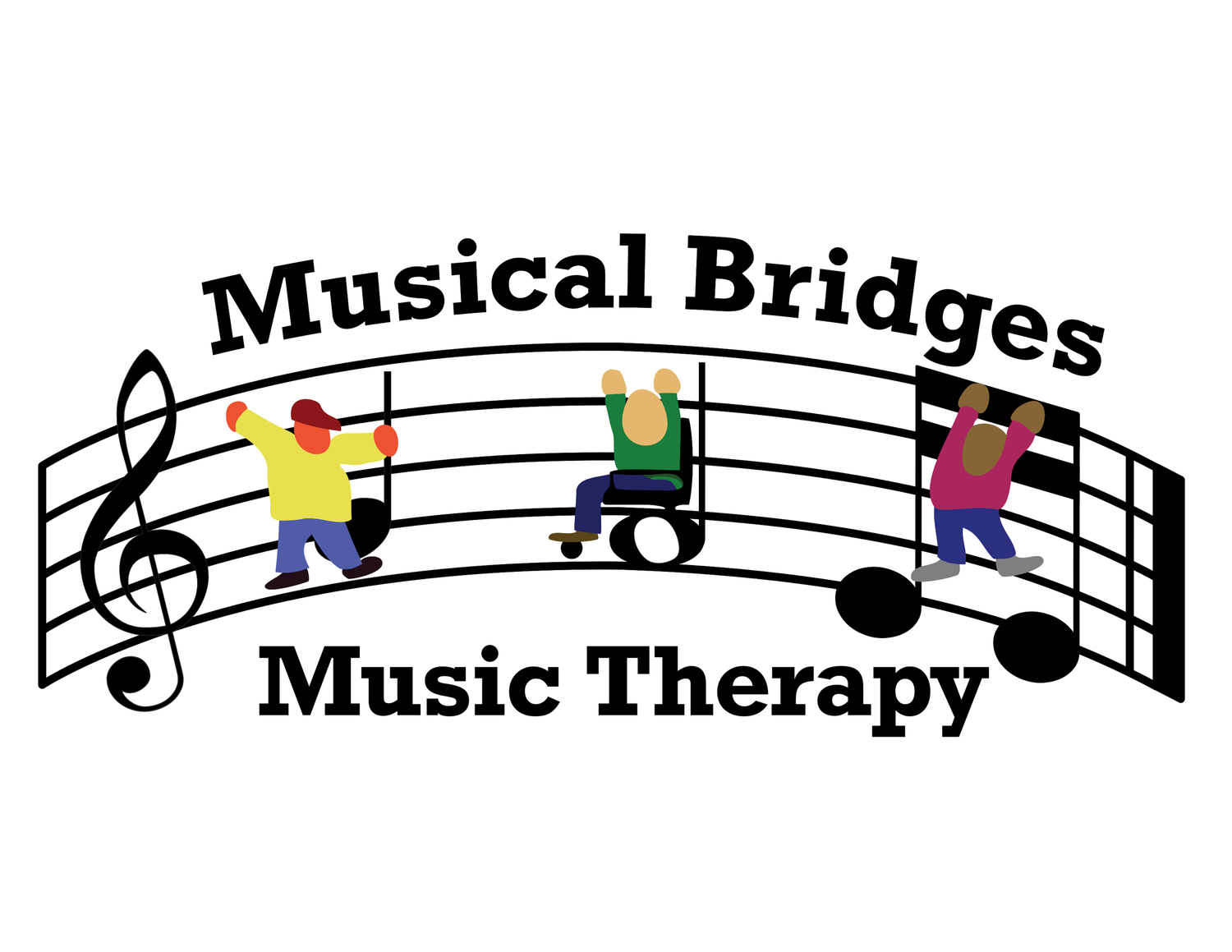Answers to Alternative Therapies Panel Questions
The panel discuss Vanderbilt’s Council for Exceptional Children student chapter last week offered some insight but was far too short a time frame to be able to delve into detail about music therapy. Thus, I thought it might be helpful to you and the students to write out answers to some of the questions I was asked in a longer format.
“Thank you @ktsplash for your wonderful comment about my talk!
“What an amazing alternative therapies panel! Excuse me while I dedicate my life to music therapy.””
Please introduce yourself, tell us your profession, and what population of students or individuals you typically work with.
I was born in Nashville and have lived in Tennessee my entire life. I started Musical Bridges in 2005 after graduating college with my music therapy degree. I work with a variety of music therapy clients ranging from early childhood to the elderly. I also teach music lessons on piano, guitar, and drums and do music enrichment classes for typically developing preschoolers.
Music Therapy is defined by the American Music Therapy Association (AMTA) as “the prescribed use of music by a qualified person to effect positive changes in the psychological, physical, cognitive, or social functioning of individuals with health or educational problems.”
What is your background in special education and what led you to where you are today?
I worked at a summer camp in North Carolina for children and adults with autism for a couple years in high school that first introduced me to individuals special needs. I auditioned for Governor’s School for the Arts (month long summer program for rising 11th and 12th grade students in Tennessee who study programs in music, art, dance, filmmaking, or theatre) on my clarinet the summer before my senior year. The clarinet professor asked me what I wanted to do “when I grew up” and I told him that I was interested in being a physical therapist. He suggested I look into music therapy and after that audition I observed every music therapist I could find in the Nashville area and fell in love with the profession. I knew going into college that it was exactly what I wanted to do with my life and haven’t strayed from that passion to this day!
What does a typical “therapeutic session look like for you and a client?
All music therapy sessions typically start with a hello song and end with a goodbye song or activity. The individual is then engaged through musical responses. I use both instrument and vocal work to encourage changes that are non-musical in nature. These could include, but are not limited to, music improvisation, songwriting, vocalization with singing, lyric discussion, movement, and more. The parent or caregiver is given feedback on work done after every session and the client is offered homework assignments to do at home to further progress. Data is collected during each session.
What is your favorite thing about your job?
My favorite thing about being in private practice is having the flexibility to making my own schedule and not adhering to the structure and hours my boss gives me. I also love that I can work with a variety of clientele that I may not be able to without the luxury of private practice. For example, I get to work with typically developing preschoolers who bring such joy to my life and also teach music lessons.
My favorite thing about music therapy is knowing that I am changing someone’s life for the better. I relish getting to be a part of even the small successes and seeing the joy on client and caregivers faces.
Do you incorporate any technology into your interactions with students/clients? If so, what?
I incorporate technology into each of my sessions in different ways. Some of the simplest to explain are:
Spotify: Spotify is similar to Pandora in that it has a free and paid version. The free version is supported by ads and the paid service costs $9.99/month. They advertise that “Spotify gives you millions of songs at your fingertips. The artists you love, the latest hits, and new discoveries just for you.” What I love about Spotify is the ability to find songs that I want to use with my clients, create playlists, and download them so I don’t have to worry about not having a strong internet signal. The difference between Spotify and Pandora to me is the ability to create playlists and also to find specific songs on the spot instead of waiting for them to randomly play on Pandora. It has literally revolutionized my life to where I don’t have to worry about buying songs and connecting my iPod/iPad up to iTunes to sync all the time. Granted there is a monthly cost but it is well worth the price to me and I couldn’t imagine life without it now.
Bluetooth Speakers: I used to carry around a clunky iPod/cd player that plugged into the wall that I never wanted to get rid of because of the beautiful sound the speakers made. Now that small bluetooth speakers have become affordable and sound good*ish* I use them in every session where I travel to a client’s home or a facility. Most the music in my sessions is live but there is a time and place for using recorded music (with my Spotify songs). I currently use Urge Soundbrick.
TapSpeak Choice: This is an app for my iPad that costs around $169 currently in the app store. My older version utilized both BoardMaker pictures and Pixxon symbols but they are now selling it with only Pixxon symbols. The app uses these pictures to create very personalized, and (if you want) sophisticated communication boards. I use this app with all of my clients who are non-verbal in various ways. There are many free options out there if you want to use a choice board app for your ipad such as ChoiceBoardCreator.
Books: I use books that incorporate music tunes ALL the time. Here are some of my favorites….
Baa Baa Black Sheep– Iza Trapani
Itsy Bitsy Spider– Iza Trapani
I’m a Little Teapot– Iza Trapani
Twinkle Twinkle Little Star– Annie Kubler
Itsy Bitsy Spider– Annie Kubler
I make many games and activities that I use with my clients as well. If you are interested in seeing any of them feel free to contact me and I’ll send you some pictures.
What is a piece of advice you may have for someone who is interested in pursuing the field that you are in?
1) Be a good musician. You need to be knowledgeable on both piano and guitar. These will be your main two accompanying instruments and the two instruments you will have to pass proficiency tests on in college. Get comfortable using your voice to sing since much of what you do in your music therapy sessions will be live music.
2) Learn to pay close attention and notice things.
3) Expect that this will be a life-long learning experience.
4) Get used to advocating for yourself. You’re going to have to educate the public constantly and stick up for yourself. You’ll need to have some thick skin when people tell you that you’re no more than the fun music lady who comes in to entertain the clients and that you aren’t a “real” therapist like speech or physical therapy.
5) Understand that you won’t be a millionaire.
What is one thing that you don’t love about your job?
One of the things that I don’t love about my job is having to constantly educate the public. I love talking about music therapy to others and sharing my love for my profession but it does get exhausting to be honest!

